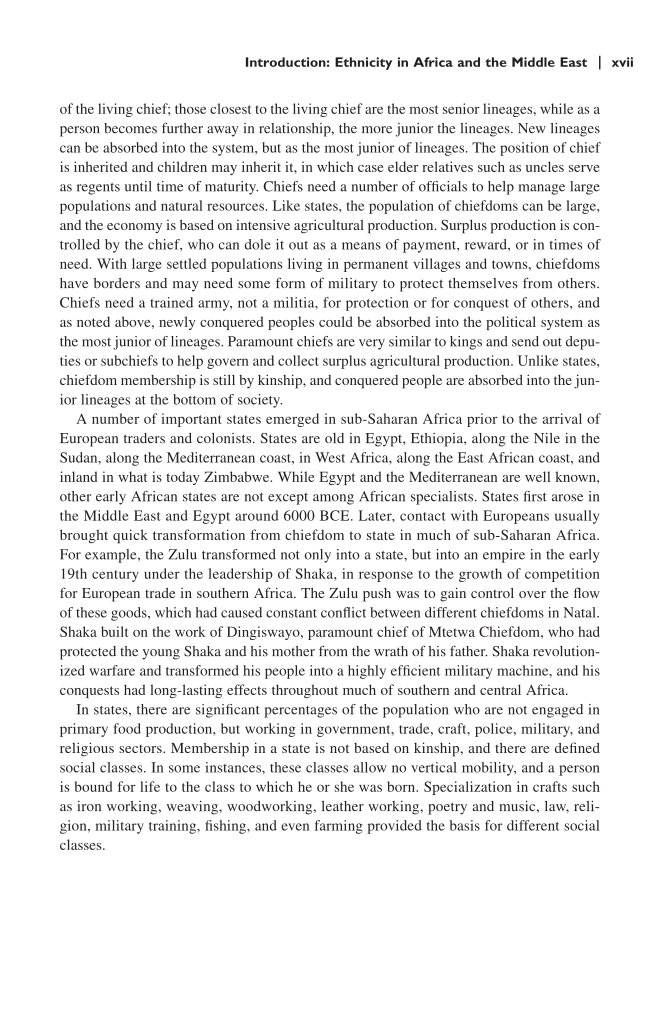of the living chief those closest to the living chief are the most senior lineages, while as a person becomes further away in relationship, the more junior the lineages. New lineages can be absorbed into the system, but as the most junior of lineages. The position of chief is inherited and children may inherit it, in which case elder relatives such as uncles serve as regents until time of maturity. Chiefs need a number of officials to help manage large populations and natural resources. Like states, the population of chiefdoms can be large, and the economy is based on intensive agricultural production. Surplus production is con- trolled by the chief, who can dole it out as a means of payment, reward, or in times of need. With large settled populations living in permanent villages and towns, chiefdoms have borders and may need some form of military to protect themselves from others. Chiefs need a trained army, not a militia, for protection or for conquest of others, and as noted above, newly conquered peoples could be absorbed into the political system as the most junior of lineages. Paramount chiefs are very similar to kings and send out depu- ties or subchiefs to help govern and collect surplus agricultural production. Unlike states, chiefdom membership is still by kinship, and conquered people are absorbed into the jun- ior lineages at the bottom of society. A number of important states emerged in sub-Saharan Africa prior to the arrival of European traders and colonists. States are old in Egypt, Ethiopia, along the Nile in the Sudan, along the Mediterranean coast, in West Africa, along the East African coast, and inland in what is today Zimbabwe. While Egypt and the Mediterranean are well known, other early African states are not except among African specialists. States first arose in the Middle East and Egypt around 6000 BCE. Later, contact with Europeans usually brought quick transformation from chiefdom to state in much of sub-Saharan Africa. For example, the Zulu transformed not only into a state, but into an empire in the early 19th century under the leadership of Shaka, in response to the growth of competition for European trade in southern Africa. The Zulu push was to gain control over the flow of these goods, which had caused constant conflict between different chiefdoms in Natal. Shaka built on the work of Dingiswayo, paramount chief of Mtetwa Chiefdom, who had protected the young Shaka and his mother from the wrath of his father. Shaka revolution- ized warfare and transformed his people into a highly efficient military machine, and his conquests had long-lasting effects throughout much of southern and central Africa. In states, there are significant percentages of the population who are not engaged in primary food production, but working in government, trade, craft, police, military, and religious sectors. Membership in a state is not based on kinship, and there are defined social classes. In some instances, these classes allow no vertical mobility, and a person is bound for life to the class to which he or she was born. Specialization in crafts such as iron working, weaving, woodworking, leather working, poetry and music, law, reli- gion, military training, fishing, and even farming provided the basis for different social classes. Introduction: Ethnicity in Africa and the Middle East xvii
Document Details My Account Print multiple pages
Print
You have printed 0 times in the last 24 hours.
Your print count will reset on at .
You may print 0 more time(s) before then.
You may print a maximum of 0 pages at a time.

























































































































































































































































































































































































































